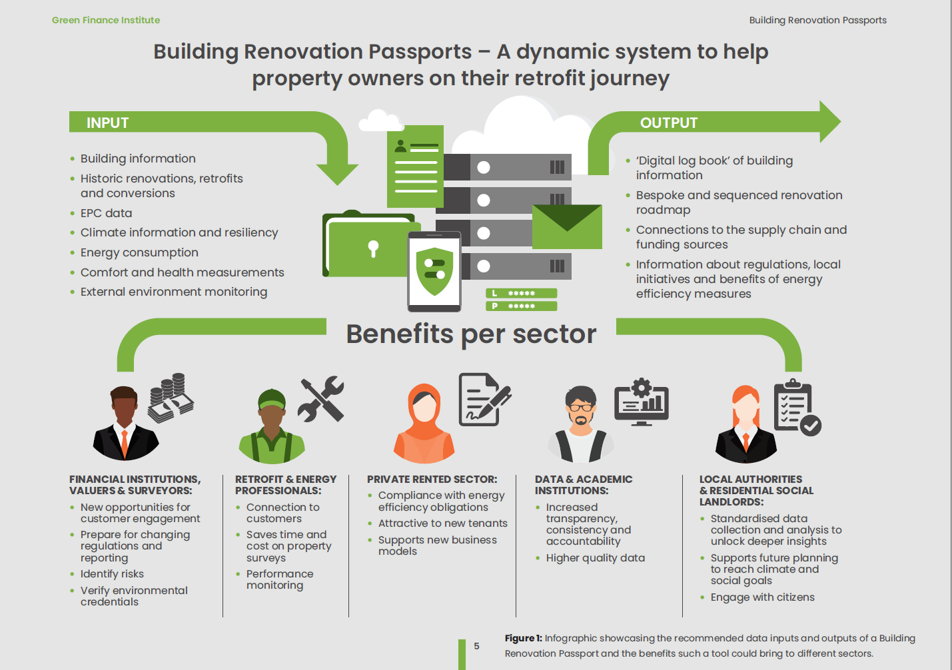Green Finance Institute puts forward recommendations to establish UK Building Renovation Passports
...as Santander and Countrywide Surveying Services launch EnergyFact tool for mortgage customers
The Green Finance Institute’s Coalition for the Energy Efficiency of Buildings (CEEB) today releases Building Renovation Passports: Creating the pathway to zero carbon homes, a report setting out the steps to establish a digital tool to help property owners access decision-useful information to retrofit their homes. The UK Committee on Climate Change recommended the introduction of BRPs1 to play a key role in delivering information to individuals and businesses along the retrofit value chain, accurately mapping the journey to a net-zero property and therefore helping to unlock the level of finance that is needed to fund retrofits at scale.
Already in use in several European countries, Building Renovation Passports (BRPs) contain a digital logbook with information about the property, its operational performance and historic renovations; and a long-term renovation roadmap that identifies future retrofit measures, along with links to contractors and finance options.
Produced in partnership with over 50 members from the retrofit energy, property and finance sectors and fields of data and academia, as well as local authorities and RSLs, the CEEB’s report presents the key recommendations for how to develop a standardised framework to support the introduction of Building Renovation Passports in the UK. It considers the data inputs and outputs required, roles and responsibilities in developing and deploying BRPs, and the cross-sectoral benefits that widespread adoption can unlock.
“With a funding gap estimated to be as large as £65 billion to decarbonise our homes, we need to ensure there is a way to gather and present accurate, current and granular information about all aspects of a property’s energy use and its roadmap to energy efficiency in one place, giving financial institutions the confidence to offer retrofit funding and the homeowner the knowledge to take it up,” says Dr Rhian-Mari Thomas OBE, Chief Executive of the Green Finance Institute.
The report’s recommendations form the basis of CEEB member Santander UK’s EnergyFact report, also launched today, in partnership with CountryWide Surveying Services. EnergyFact is being offered free of charge to existing Santander mortgage customers who are moving property or remortgaging and taking on additional borrowing for home improvements. The report analyses a property’s current energy use and helps customers to understand the steps they could take to reduce this, by altering their behaviour or retrofitting energy efficiency improvements in their home, and save themselves money. The survey also links to tradespeople who could assist with any retrofitting improvements required. Santander is one of the first lenders to offer homeowners a bespoke emissions-lowering roadmap, taking the first major step towards mainstreaming the concept of BRPs.
“Helping homeowners and landlords to make more informed decisions about improving their own energy efficiency is a key first step towards the Government’s target of achieving net-zero carbon emissions by 2050. We’re proud to be supporting this, both through our active role in the Green
Finance Institute’s Coalition for the Energy Efficiency of Buildings, and through the launch of our own EnergyFact report today,” says Brad Fordham, Head of Mortgages, Santander UK.
“We are very proud to have been the first surveying firm to develop this type of report and work alongside Santander to bring it to market for their customers. Improving the knowledge and awareness of the steps homeowners can take to improve their property’s energy efficiency is vital if we are to reduce our carbon footprints,” says Matthew Cumber, Managing Director Countrywide Surveying Services.
Achieving the UK’s net-zero ambitions and delivering on the Prime Minister’s Ten Point Plan requires accessible, decision-useful information to help homeowners assess and address the carbon impact of their property. The adoption of Building Renovation Passports in the UK has the potential to benefit all elements of the sector: BRPs provide the retrofit supply chain with connections to customers and property information to inform the works needed; they allow private landlords to ensure compliance with energy efficiency standards and to attract tenants to energy-efficient properties; they give local authorities and affordable housing providers information needed to make retrofit decisions and to meet climate and fuel poverty targets; and they help valuers and estate agents correlate energy efficiency and property values, and mortgage lenders to better assess risks to their portfolios.
The GLA’s Deputy Mayor for Environment and Energy, Shirley Rodrigues, says, “Energy used to heat and power homes is responsible for around one third of the London’s greenhouse gases, so making those homes energy efficient to a high standard will play a crucial role in tackling the climate emergency. That’s why in London we’re pushing forward to retrofit thousands of homes and have recently helped secure over £160m in energy efficiency funding for the capital.
“By tracking the progress of retrofit works and making information accessible, Building Renovation Passports will be an important tool in helping to put all homes on a pathway to zero carbon. They will help to develop the supply chain for energy efficiency measures required, supporting green jobs and London’s green recovery from COVID-19.”
Pedro Guertler, Programme Leader, E3G, says, “Accelerating the scale and pace of green home retrofits will be crucial for getting the UK on track to meet its climate targets. Detailed and accurate data and advice is essential to help homeowners take the steps necessary to make their homes warmer, cheaper to run and reduce carbon. Building Renovation Passports can play a central role in meeting this challenge, and E3G is pleased to support the Coalition’s work to develop a framework for introducing these tools for the UK market.”
The CEEB is inviting feedback from energy, data, retrofit and finance professionals, in order to further develop and publish an industry-backed framework to help introduce Building Renovation Passports in the UK.

Published: 12 March 2021





